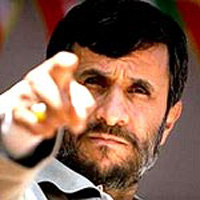Political situation in Iran ready to explode
Iran is standing on the verge of chaos after sitting President Mahmoud Ahmadinejad won the first stage of the presidential election in the country on June 12. His three rivals received less than a third of all votes, which triggered massive riots across the nation. Mir-Hossein Mousavi, who obtained 33 percent of the votes cast, stated that the election had been totally fabricated. Two other candidates - Mohsen Rezaee, former Commander of the Iranian Revolutionary Guard, and Mehdi Karroubi, former Speaker of the Majlis, - said that they would support Moussavi in his endeavor to revise the election results.

Electors in the East traditionally vote for the candidates from their territories, where they reside. The tradition did not work this time. For example, Ahmadinejad received five times more votes in Moussavi’s native city of Tabriz. The results in the Province of Lorestan turned out to be fantastic: the sitting president of Iran enjoyed 18 times more votes than Karroubi, a native of the province. This is probably the reason why the candidates cast doubts on the official results of the vote.
Ahmadinejad claimed that the riots had been organized by external forces and said that he would be ready to establish law and order in the country militarily.
Sergey Demidenko, an expert with the Institute for Strategic Analysis, told Pravda.Ru that the current riots did not mark anything extraordinary for Iran.
“Such things occur there periodically. It happened in 1999, 2000 and in 2006. The driving force of the riots is the people who strive for changes in the country – mostly the youth, including students. They gather around Moussavi, who is deeply concerned about the results of the vote. The protests will not lead to anything – no one is going to revise the results of the Iranian election, they are final. Ahmadinejad is the winner and that’ s it.
“It would not be correct to look for any implication of the USA or the West here. All candidates go through the Supervisory Council, which has a very strict selective procedure at this point. It would never let a pro-Western Iranian run for president if he would be ready to infringe upon the state organization of the country, including the predominance of spiritual authorities over the secular power,” the specialist said.
The president is not the most important persona in Iran. It is the prerogative of Ayatollah – the spiritual leader of Shiite Muslims. Anyone willing to change this will not be allowed to run.
It is worthy of note that Iran’s supreme leader, Ayatollah Ali Khamenei urged the protesters on June 14 to recognize the results of the vote and refrain from provocative actions and statements. The people did not hear their leader. Ahmadinejad’s prime rival, Moussavi, addressed the spiritual leaders of the nation with an appeal not to take a silent position claiming that the Islamic Republic may turn into a despotic regime.
The protesters throw stones and gasoline bombs at the police and use the successful tactics of the 1979 Islamic Revolution. They climb onto the roofs and use loud-speakers to call everyone to stand up against the authorities.
Will the Iranian authorities be able to clean up the mess in the country? Foreign journalists are already being expelled from Iran, which may show that the government is taking measures to use military forces to subdue the riots.
Sergey Balmasov
Pravda.Ru
Subscribe to Pravda.Ru Telegram channel, Facebook, RSS!





